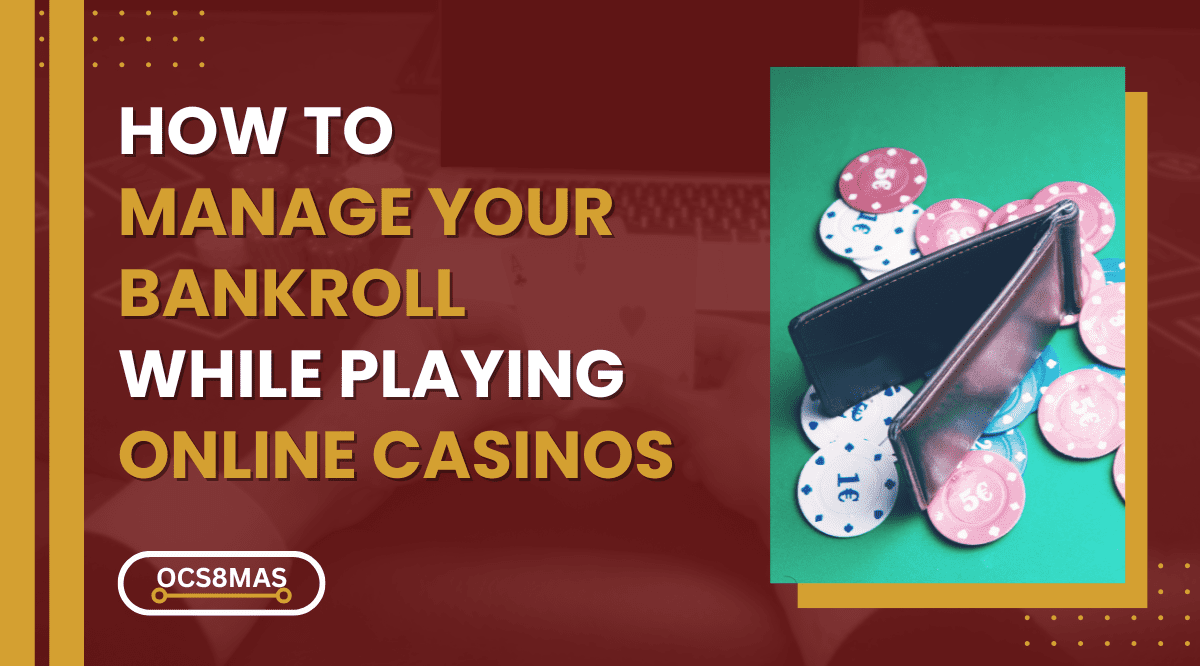How to Manage Your Bankroll Effectively While Playing Online Casinos

Table of Contents
Managing your bankroll effectively is the key to enjoying online casino games without taking unnecessary financial risks. Whether you are an experienced player or just getting started, knowing how to allocate, control, and optimize your funds is essential for long-term success. Bankroll management goes beyond knowing when to bet or how much to wager—it’s about ensuring that you can continue to play responsibly while minimizing losses and maximizing enjoyment.
In this guide, we’ll provide practical advice on how to manage your bankroll effectively in OCS8 online casino Malaysia, so you can make smarter decisions and stay in control of your gaming experience.
1. What is Bankroll Management?
Bankroll management is the practice of setting aside a specific amount of money for gambling and managing that amount wisely throughout your gameplay. It’s an essential skill for any online casino player, as it helps to prevent financial strain and keeps the gambling experience enjoyable and sustainable.
When you approach online casinos, it’s important to remember that your bankroll is the money you’re willing to lose without impacting your daily finances. This is why separating your gambling funds from your regular income or savings is crucial. Successful players treat their bankroll as a business investment—they control how much they spend and analyze their returns, all while making sure they don’t deplete their funds.
Key Takeaways:
- Bankroll management helps you stay in control of your gambling habits.
- It is a discipline that allows you to extend your gameplay over time.
- Proper management reduces the risk of chasing losses and making impulsive bets.
2. Setting a Budget Before You Play
Before you start playing at an online casino, one of the most important steps is to set a clear and realistic budget. This budget should reflect the amount of money you’re comfortable spending without affecting your financial well-being.
Tips for Setting a Budget:
- Determine disposable income: Make sure the money you are budgeting for online gambling is considered “disposable income.” In other words, it shouldn’t come from funds meant for bills, groceries, or savings.
- Weekly or Monthly Limits: Set weekly or monthly gambling limits based on how frequently you play. For example, if you’re playing casually, a monthly limit might work better, but if you’re a regular player, weekly limits might give you more control.
- Stick to Your Limit: Once you set a budget, it’s important to stick to it. Many online casinos allow you to set limits directly on their platform, helping you control how much you deposit or spend.
This level of discipline ensures that you are always in control of your spending, and prevents any financial stress that could result from gambling beyond your means.
3. Dividing Your Bankroll for Different Games
Each type of casino game comes with varying degrees of risk, and it’s essential to divide your bankroll accordingly. For instance, you wouldn’t want to bet the same amount on high-risk slot machines as you would on games like blackjack or baccarat, where the house edge is lower.
How to Divide Your Bankroll:
- Slots vs. Table Games: Games like slots are based entirely on chance, making them high-risk but potentially high-reward. Meanwhile, table games like blackjack and baccarat offer lower house edges, making them more suitable for a larger portion of your bankroll.
- Risk Management: Decide how much you are willing to risk for each game. For example, you may allocate 60% of your bankroll to lower-risk games like blackjack and baccarat, and 40% to high-risk games like slot game online Malaysia or roulette.
- Avoid All-In Bets: Never bet your entire bankroll on one game, regardless of how confident you feel. A good rule is to limit your wager to 1-5% of your total bankroll on any single bet.
This method of bankroll division helps minimize losses while allowing you to enjoy a variety of games without jeopardizing your funds.
4. Tracking Your Wins and Losses
Many players overlook the importance of tracking their wins and losses. However, this is a critical component of bankroll management. By keeping a record, you can analyze your gaming patterns, see how much you’re spending, and adjust your strategy accordingly.
How to Track Your Results:
- Keep a Gambling Log: Write down the amount you start with, how much you bet on each game, and your wins and losses. Many players find spreadsheets helpful for this purpose.
- Evaluate Monthly: At the end of each month, review your results. Are you losing more than you anticipated? Are you meeting your gaming goals? This evaluation helps refine your future betting strategy.
- Adjust Your Bankroll as Needed: If you’re consistently losing more than your budget allows, it may be time to reassess your approach or take a break.
Tracking your results offers valuable insights into your gameplay, helping you stay aware of your bankroll’s health and make more informed decisions going forward.
5. Setting Win and Loss Limits
One of the most effective ways to manage your bankroll is to set both win and loss limits. These limits dictate when you should stop playing, whether you’re on a winning streak or a losing streak.
How to Set Limits:
- Win Limit: Set a win limit that determines when you’ll walk away with your profits. For example, if your goal is to double your starting bankroll, stop playing once you reach that goal.
- Loss Limit: Your loss limit is the maximum amount you’re willing to lose in a session. Once you hit that limit, stop playing to avoid chasing losses, which can lead to poor decisions and further losses.
Win and loss limits help prevent emotional decisions and ensure that you’re playing with a clear strategy in mind, keeping your bankroll safe from excessive losses.
6. Avoiding the Trap of Chasing Losses
One of the most dangerous habits in gambling is the urge to chase losses, where players continue to bet in an attempt to recover previous losses. This behavior can quickly drain your bankroll and lead to financial difficulties. It’s important to acknowledge that losing is part of the gambling experience, and it’s essential to keep your emotions in check when it happens.
How to Avoid Chasing Losses:
- Stick to Your Loss Limit: Once you hit your loss limit, stop playing. Trying to recover your losses often leads to riskier bets and further losses.
- Take Breaks: When you lose, taking a short break from the game allows you to cool down and reset mentally before making your next move.
- Focus on Long-Term Play: Remember that gambling is about the experience and not just the results of one game. Keeping a long-term perspective helps reduce the impulse to chase losses.
7. Taking Advantage of Casino Bonuses
Many online casinos offer bonuses, such as welcome bonuses, reload bonuses, or cashback offers, which can significantly extend your bankroll. However, it’s essential to understand the terms and conditions attached to these bonuses before claiming them.
Maximizing Bonus Value:
- Read the Terms: Every bonus comes with wagering requirements, which dictate how many times you must bet the bonus amount before withdrawing any winnings.
- Use Bonuses Wisely: Focus on using bonuses for lower-risk games with a higher return-to-player (RTP) percentage, such as blackjack or video poker, to increase your chances of meeting wagering requirements.
- Set Bonus-Specific Limits: When using bonuses, apply the same bankroll management strategies to ensure you don’t overspend just to meet the bonus requirements.
Properly utilizing bonuses can give your bankroll an extra boost, allowing you to play for longer without dipping into your funds.
8. The Importance of Emotional Control
Emotional control plays a significant role in managing your bankroll effectively. When emotions take over, players are more likely to make impulsive decisions, which can lead to poor bankroll management and financial losses.
How to Manage Emotions While Gambling:
- Stay Calm: Regardless of whether you’re winning or losing, always maintain a calm and collected demeanor. This helps you stick to your strategy and bankroll management plan.
- Set a Time Limit: Along with setting win and loss limits, set a time limit for each session to avoid overplaying due to emotional highs or lows.
- Walk Away from Tilt: If you find yourself feeling frustrated or angry after a losing streak, it’s best to walk away from the game until you regain emotional clarity.
By staying in control of your emotions, you’ll be able to make better decisions that align with your bankroll management strategy.
9. Know When to Walk Away
One of the most valuable skills in bankroll management is knowing when to walk away, whether you’re ahead or behind. Greed can often lead players to keep playing after they’ve reached their win limit, which may result in losses that could have been avoided.
How to Know When to Quit:
- Stick to Your Win Limit: Once you’ve reached your win limit, take your winnings and walk away. Don’t let the temptation of winning more cause you to risk your profits.
- Accept Losses Gracefully: If you’re on a losing streak and have hit your loss limit, it’s time to stop. Remember that losing is a natural part of gambling, and it’s better to end the session on a controlled note than to continue chasing losses.
Knowing when to quit ensures that you leave the game with your bankroll intact and ready for future gaming sessions.
Conclusion
Managing your bankroll effectively while playing at online casinos is one of the most crucial skills for maintaining long-term enjoyment and preventing financial difficulties. By setting a budget, dividing your funds based on the games you play, tracking your results, and using bonuses wisely, you can optimize your gameplay and avoid unnecessary losses. Remember, gambling should always be fun, and proper bankroll management helps ensure that it stays that way.
FAQs
- What is bankroll management in online casinos?
Bankroll management involves setting a budget for gambling and ensuring that you stick to it to avoid losing more than you can afford. - How much of my bankroll should I bet on each game?
It’s generally recommended to bet between 1-5% of your total bankroll on any single game to minimize risk. - What are win and loss limits?
Win and loss limits are pre-set amounts that dictate when you’ll stop playing—either after reaching a certain profit or after losing a set amount. - Can I use casino bonuses to help manage my bankroll?
Yes, casino bonuses can extend your bankroll, but always check the terms and wagering requirements before using them. - How do I track my wins and losses?
You can track your wins and losses by keeping a gambling log or using a spreadsheet to monitor your betting activities, winnings, and losses over time.
By following these bankroll management strategies, you can play smarter, stay in control, and most importantly, have fun while gambling online.
- How to Play Jackpot Slots in Malaysia and Win Big - March 13, 2025
- Which Online Casino Bonuses Are Worth Claiming in 2025? - March 13, 2025
- Are Crypto Casinos Legal in Malaysia? What You Need to Know - March 5, 2025
Relevant news

How to Play Jackpot Slots in Malaysia and Win Big
Jackpot slots are among the most exciting casino games, offering the potential for massive payouts…

Which Online Casino Bonuses Are Worth Claiming in 2025?
Online casino bonuses are one of the biggest attractions for players in Malaysia, offering a…

Are Crypto Casinos Legal in Malaysia? What You Need to Know
Cryptocurrency is revolutionizing various industries, and the online gambling sector is one of the biggest…

Why You Should Try Lottery Betting at OCS8
For generations, Malaysians have been drawn to lottery games, dreaming of hitting the jackpot and…

How OCS8 Offers the Fastest Casino Withdrawals in Malaysia
When it comes to online gambling, one of the most crucial factors for players is…

Why Live Dealer Games at OCS8 Offer the Best Casino Experience
The rise of live dealer casino games has transformed the online gambling industry, offering an…


